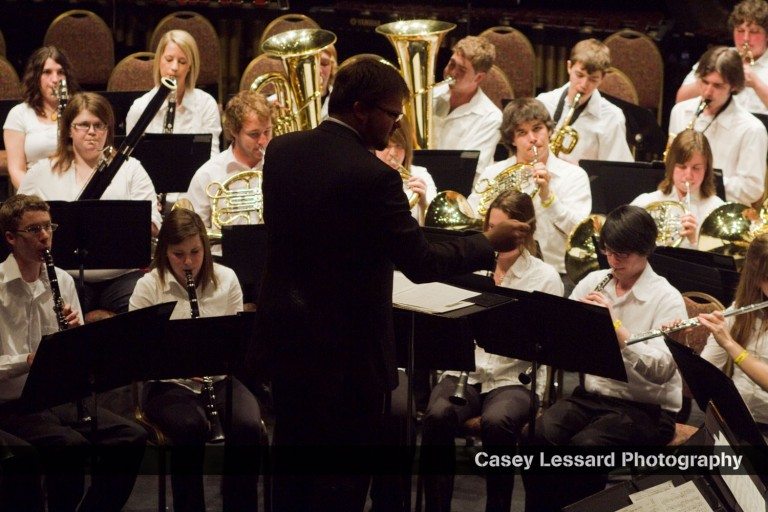
Story and photos by Casey Lessard
They’re the best percussion ensemble in Canada, and they’re right here in our backyard. Led by music director Isaac Moore and coach Dave Robilliard, South Huron District High School’s percussionists won the Zildjian Outstanding Percussion Section Award at this year’s MusicFest Canada national competition in Ottawa May 22; graduating student Jon Gill of Grand Bend, who is attending UWO for music in the fall, won the Zildjian Outstanding Percussionist Award. Judge and seminar leader Wayne Toews called the group the best student percussion ensemble in Canada, and could challenge any group in the world. If that’s the case, says Robilliard, it’s because the students are fully committed to success.
“We challenge our students in a way that other percussion ensembles I’ve seen in Canada are not challenged,” says Robilliard. “We give them – and they’ve requested – very difficult material that requires extra time and rehearsal on their time. It’s one of the best things (judge) Wayne Toews has seen in high school percussion ensembles, so in his eyes, it’s world class. It’s a very flattering statement.”
The accolades came hours after performing at the nationals; the percussionists performed last and earned a gold standard, while two other groups led by Moore and fellow teacher Matt Weston – the senior concert band and senior jazz bands – performed earlier the same day, each earning the silver award.
“A lot of kids in the music program are goal-oriented students,” says Moore, “and they respond well to having a goal. Whether we go to nationals or regionals, that goal is one of the things that motivate them to continue to get better. MusicFest Canada is on a different level because you have 10,000 kids from across Canada who are passionate about music. Something really special gets created when you put them together in the same place.”
To compete at nationals, the bands had to earn either gold or high silver with invitation at the regional competition in London. When the nationals are held in Ottawa, South Huron finds it convenient to attend, and a great experience as well.
“Ottawa is a great place to play, and the National Arts Centre is one of the best concert halls in the country, as it should be,” Moore says. “The experience of playing in that building and hearing other bands in that building, it’s incredible for them. It’s probably something a lot of them won’t have the opportunity to do again, so it’s important for me that every student experience the nationals if possible.”
During the years when the competition is not in Ottawa, Moore and Weston take the music students on non-MusicFest trips, including last year’s trip to Chicago. It’s part of Moore’s mission to give a rounded music education.
“A teacher I had while at university asked, are you giving your students a fantastic four-year band program, or are you giving your students a fantastic band program for four years, as in the same program for four years,” he says.
“A lot of what we do is based on routine and tradition, and it called into question for me how you maintain tradition and routine, but also offer the kids a different experience over the four years they are here. It opened my mind to the different options of where kids can go and what they can learn. In the four years you’ve got, you can do a lot.”
This year’s trip to the nationals was the second for Robilliard, whose father Bob was music director at South Huron for many years. After returning to Canada from graduate school in Oklahoma, Dave Robilliard joined Moore and Weston – the three studied percussion together at UWO – three years ago to lighten their load.
“I am able to focus on techniques and sound concepts that Isaac and Matt can’t focus on in the large classroom or band settings,” says Robilliard, who, unlike education majors Moore and Weston, pursued performance at university. He now works with the Stratford and International Symphonies, serves as a substitute for the Kitchener and Windsor Symphonies, and performs in a percussion group called DuO. His contribution has led to great success for the students.
“We received a gold standard in 2008,” he says, “which was my first year working with percussion ensemble. There was still a large number of carryover of students this year – Jon Gill, Joe Pavkeje and Jeff Penn – and we won gold again. But we don’t do it for the awards. We want to see students grow as musicians and see their confidence grow on stage.”
While South Huron has a full trophy case – and that’s just from this year – Moore agrees that they’re not looking for pats on the back.
“The real measure of success is how we feel about our performances when we’re done. I measure our success as a teacher how we fare when we compete at a higher level (the 2008 bronze winning senior concert band competed in a higher bracket this year and earned silver). If we were not taking the kids to an uncomfortable place, it would be an exercise in self-confidence. It makes more sense to shoot a little beyond where you might be so you can develop.”
The success can be attributed to the approach of the teachers, and the commitment of the students.
“It’s a lot of practice, a lot of one-on-one with your section and Mr. Moore,” says graduating student Trish Pavkeje, who performed in the concert and jazz bands. “It helps that Mr. Moore and Mr. Weston are easy to talk to. It’s easy to ask them for help.”
“Everyone’s on the same level and enjoys being there with everyone else,” says Joe Pavkeje, a member of all three groups, winner of the national honour award for the jazz band, and SHDHS student of the year. “Our school isn’t segregated into athletic kids and music kids. Everyone is doing everything. It feels cohesive for that reason.”
Clarinet player Stephanie Pratt agrees.
“Kids from all over the school are in this, so you get a sense of diversity,” Pratt says, noting music is attractive because of the lessons you learn. “Self-discipline is important, you learn a lot of patience and togetherness.”
For Stephen Mills, who has experienced bullying at school, the inclusivity makes the music room a refuge.
“We have to work together to do anything in the band,” Mills says. “We all have to talk to each other, and when you have to talk to someone, you appreciate them for who they are.”
And that’s exactly what Isaac Moore wants to hear.
“If a student is willing to commit themselves to the educational experience, we try not to discriminate in any way. Students can find their place in the band based on their strengths and weaknesses. Without your strong players and weaker players, you can’t maintain consistency. Eventually the weak players become strong and take over the leadership roles.”
Now that many members of the successful bands are graduating, Moore, Weston and Robilliard look to the future.
“We take it year by year,” Robilliard says. “The younger students will now have an opportunity to succeed at a higher level than they’ve had in the past. We’re going to do a lot of different pieces in different styles, and give everyone an opportunity to learn and grow.”

